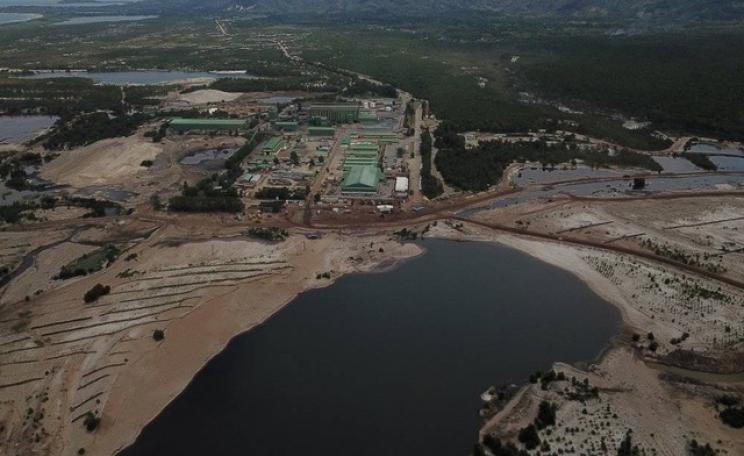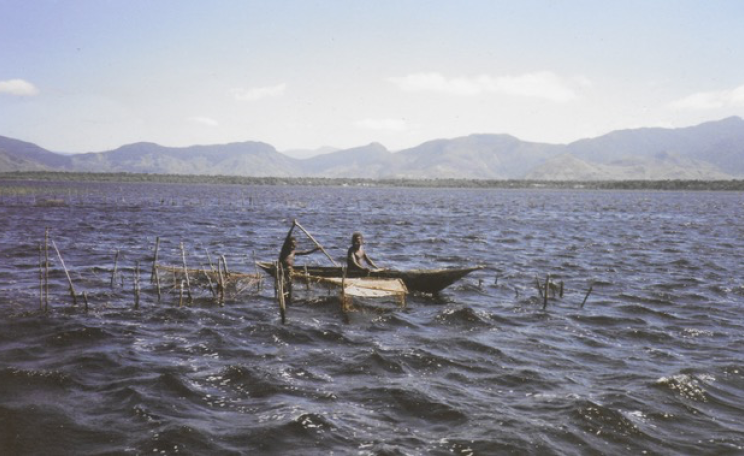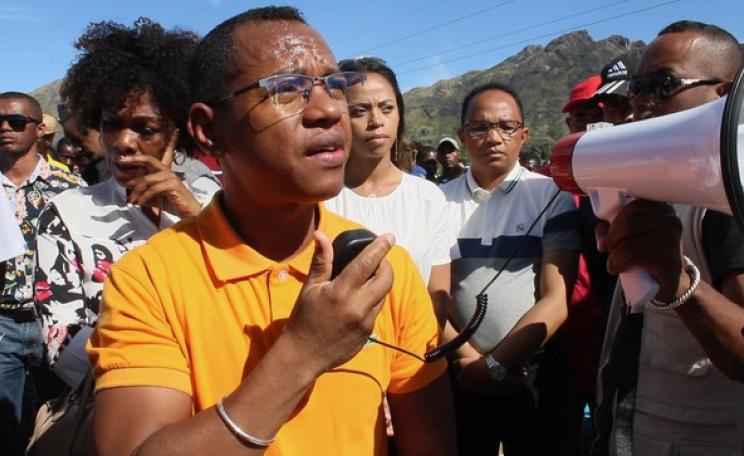The practice of selective self-reporting against compliance is at the heart of Rio Tinto’s credibility around QMM mine issues, including its water and tailings management.
A petition with 78,000 signatures will be presented to Rio Tinto demanding independent audits of its Qit Minerals Madagascar (QMM) mine in Madagascar, in the wake of more conflict.
The Ekō petition follows two tailings dam failures at the QMM mine in 2022 with ensuing fish deaths, a fishing ban, and months of conflict.
New evidence suggests the mining company never conducted a fully independent investigation into the root cause of the dam failures, as had been promised to civil society and investors after the events.
Investigation
QMM’s tailings dam failures occurred after a series of cyclones and heavy rains in February and March last year.
QMM told civil society in Madagascar at the time that there would be an investigation into the incidents, which had resulted in QMM releasing a million cubic metres of toxic mine basin water into the environment to avoid further, uncontrolled release.
QMM said they would use an external provider, Intersafe, for this investigation. A report would follow and be openly shared. A year and a half later, despite repeated requests, there is still no sign of any report from Intersafe, or any other independent expert.
It now seems that a fully independent investigation into QMM tailings dam failures has not taken place. The Ecologist has access to correspondence that confirms Rio Tinto only carried out an internal review, using Intersafe to remotely ‘support’ their own process.
Credibility
Rio Tinto has positioned itself as a lead partner in the UNEP and Church of England Pension Fund initiative for Global Industry Standards for Tailings Manageme (GISTM).
To meet the August 2023 deadline for GISTM compliance, Rio Tinto published updated tailings management status. This shows QMM had an “Independent Expert Review” in March 2022. This is the same time when QMM said the Intersafe investigation of the dam failures would occur.
It is unclear whether investors would agree that a Rio Tinto internal review counts as “independent” and meets GISTM standards. Moreover, the waiting time to discover there was no independent investigation, no Intersafe report, with a year and a half of obfuscation by the company, should be a red flag to investors.
Track record
The practice of selective self-reporting against compliance is at the heart of Rio Tinto’s credibility around QMM mine issues, including its water and tailings management.
The practice of selective self-reporting against compliance is at the heart of Rio Tinto’s credibility around QMM mine issues, including its water and tailings management.
For example, after QMM breached an environmental buffer zone, extending as much as 167m beyond its permitted limits and placing mine tailings onto the bed of Lake Besaroy, the company insisted that QMM was compliant.
Two years of inquiry later, when finally forced to admit QMM’s breach, Rio Tinto assured shareholders that according to the Malagasy government the breach was of “no significant concern” and impact “negligible”.
However, neither the company nor the government could provide a single technical study to support this analysis. Finally, the company admitted it was not aware of any such report.
Government role
The poor reporting is especially problematic because QMM has a fiscal relationship with the environmental regulator, to whom it pays a minimum of $40,000 dollars per year to monitor the mine’s performance.
As a joint owner in the mine, the Malagasy government is conflicted. This year Rio Tinto has pledged millions of dollars to the government in advance dividend as part of QMM’s recently signed, new lease agreement.
It is an election year and the governing party is badly in need of good news stories and campaign funds.
Firewalled
As well as exonerating operational actions that break Malagasy laws - such as QMM’s unauthorised buffer breach, the government provides a useful firewall for the company.
QMM frequently claims it cannot share technical reports unless the government regulator agrees, and insists that requests for QMM reports be made directly to the regulator.
The National Office for the Environment (ONE), and the national water agency, ANDEA, rarely publish or create ready access to their reports on QMM.
One example is reports for the fish deaths following the 2022 tailings dam failures. ANDEA did not release the studies. However, they were accessed by civil society and analysed by radioactivity expert Dr Swanson.
Swanson concluded the study and the report were inadequate, as “there were insufficient data to support definitive statements regarding risk to fish or to humans.”
Unscientific
Throughout 2022, and at the 2023 AGM, Rio Tinto cited these studies to assert that the QMM mine was not responsible for fish deaths.
The irony is not missed that, while distancing itself from the fish deaths on the one hand, QMM was rapidly installing a $13m treatment plant to address the most likely cause of the fish deaths: acid mine drainage from high aluminium and low pH, as found in QMM’s mine basin water.
Questions about how QMM will deal with the toxic waste from this new treatment plant, and how they will address other heavy metals in the mine basin waters, e.g., uranium and lead, remain unanswered.
Human rights
In reality the company has failed to answer dozens of technical questions since 2017, and local people have endured twenty years of poor communications from QMM.
At a meeting with Malagasy civil society representatives in 2022, Rio Tinto’s CEO conceded that QMM’s community social performance (CSP) had failed.
Last year’s fish deaths alone caused months of hardship and conflict, which is still unresolved.
The compensation process to over 5,000 villagers that followed a conflict resolution process last May was reportedly marred by human rights violations and inadequate payments.
In April Rio Tinto declined requests to allow an independent audit of QMM’s compensation process to address the violations. An audit may have resolved issues and helped prevent the current unrest.
Repeat conflict
Conflict broke out again this June when more than 15,000 villagers signed a petition asking the mine to be stopped while water and compensation issues, amongst other problems, could be resolved.
QMM’s lack of uptake to requests for direct dialogue from the local association involved led to street protests. Dispersed by armed militia, 120 villagers were arrested and 87 imprisoned, including women.
The state prosecuted the protestors and issued arrest warrants for their leaders. Charged with ‘undermining state security’, they risk five years imprisonment. It is the fourth conflict in less than two years.
Rio Tinto blames the villagers for the clashes with security forces and has distanced itself from the arrests. However, in the QMM joint venture between Rio Tinto and the Malagasy Government, partners are jointly and severally liable for each other’s acts.
While the company faces no penalties for its actions, villagers face imprisonment and legal action for theirs – especially when they contest the outcome of QMM’s grievance process. A process the parent company already admits does not meet international standards.
Independent audits
The company’s resistance to allowing independent auditors to the site is palpable. The ACCR has said that QMM’s refusal to accept an independent audit is reason enough to conduct one, and the company risks compromising its social licence.
Rio Tinto’s legacy in Bougainville and the Juukan Gorge debacle provide ample lessons for reviewing the situation at QMM to ensure the company does not repeat past mistakes.
Looking to the future, it is in everyone’s interests to ensure independent audits of QMM now.
A spokesperson for Rio Tinto told The Ecologist: "We take concerns raised by our host communities and feedback from our stakeholders seriously and remain committed to ongoing engagement to address concerns and find better ways of working together."
This Author
Yvonne Orengo is an independent communications consultant and director of the Andrew Lees Trust (ALT UK) a British charity set up following the death of its namesake in 1994. ALT UK is working with Publish What You Pay (PWYP) Madagascar and international campaigners to research and advocate about the impacts of the QMM mine on rural communities in Anosy region, Southern Madagascar. Yvonne lived and worked in southern Madagascar to develop social and environmental programmes and has followed the evolution of the Rio Tinto/QMM mine for almost thirty years.




